Filter by
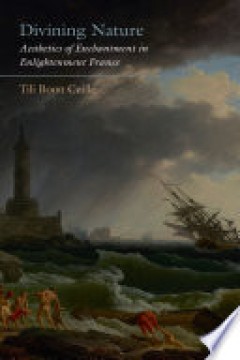
Divining Nature: Aesthetics of Enchantment in Enlightenment France
The Enlightenment remains widely associated with the rise of scientific progress and the loss of religious faith, a dual tendency that is thought to have contributed to the disenchantment of the world. In her wide-ranging and richly illustrated book, Tili Boon Cuillé questions the accuracy of this narrative by investigating the fate of the marvelous in the age of reason. Exploring the affiniti…
- Edition
- -
- ISBN/ISSN
- 9781503614178
- Collation
- -
- Series Title
- -
- Call Number
- 700.108094409033 CUI d
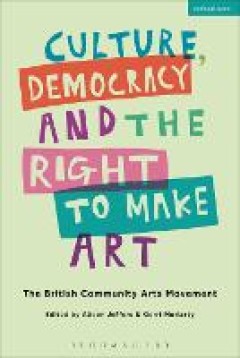
Culture, democracy and the right to make art : the British community arts mov…
Based on the words and experiences of the people involved, this book tells the story of the community arts movement in the UK, and, through a series of essays, assesses its influence on present day participatory arts practices. Part I offers the first comprehensive account of the movement, its history, rationale and modes of working in England, Northern Ireland, Scotland and Wales; Part II brin…
- Edition
- -
- ISBN/ISSN
- 9781474258388
- Collation
- xiv; ill; 280 p.
- Series Title
- -
- Call Number
- 700.10309410904 JEF c
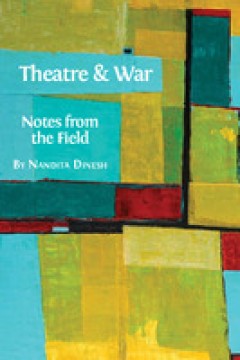
Theatre and war : notes from the field
"Nandita Dinesh places Kipling’s ""six honest serving-men"" (who, what, when, where, why, how) in productive conversation with her own experiences in conflict zones across the world to offer a theoretical and practical reflection on making theatre in times of war. This timely and important book weaves together Dinesh’s personal narrative with the public story of modern conflict, illustratin…
- Edition
- Edition 14
- ISBN/ISSN
- 9781783742585
- Collation
- 210 p
- Series Title
- -
- Call Number
- 809.293581 DIN t
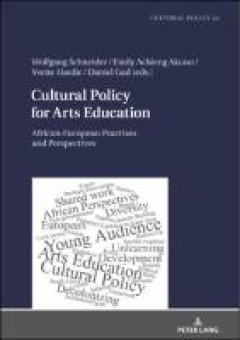
Cultural policy for arts education : African-European practises and perspectives
Arts Education institutions and programs create an excellent framework for personality development: learning knowledge, learning skills and learning life. Their attainment requires education to be a holistic concept of advancement that includes aesthetic practice and involvement with the arts. It challenges them to use their actions to think about the meaning of life, in as much as everyone can…
- Edition
- -
- ISBN/ISSN
- 9783631866801
- Collation
- 322 p
- Series Title
- -
- Call Number
- 700.71 CUL c
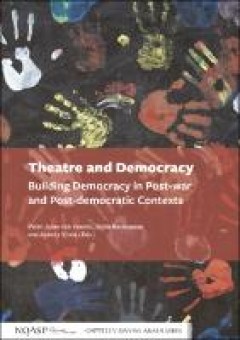
Theatre and democracy : building democracy in post-war and post-democratic co…
Theatre and Democracy: Building Democracy in Post-war and Post-democratic Contexts is the outcome of a longstanding collaboration between two centers of applied theatre education and research in South-Africa and Norway, respectively (2017–2022). It presents knowledge, critical conversations and artistic work related to issues of democracy, both historical and contemporary. Within the global f…
- Edition
- -
- ISBN/ISSN
- 9788202711825
- Collation
- 285 p.
- Series Title
- -
- Call Number
- 792 THE t
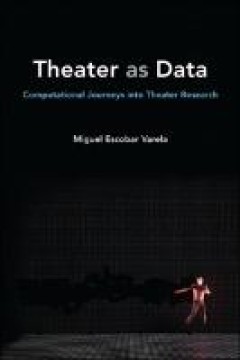
Theater as data : computational journeys into theater research
In Theater as Data, Miguel Escobar Varela explores the use of computational methods and digital data in theater research. He considers the implications of these new approaches, and explains the roles that statistics and visualizations play. Reflecting on recent debates in the humanities, the author suggests that there are two ways of using data, both of which have a place in theater research. D…
- Edition
- -
- ISBN/ISSN
- 9780472128631
- Collation
- VIII, 222 p.
- Series Title
- -
- Call Number
- 792.028 ESC t
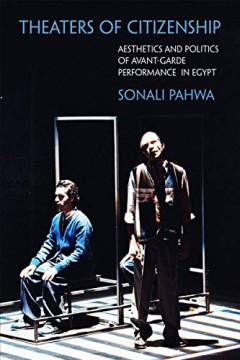
Theaters of citizenship : aesthetics and politics of avant-gardist performanc…
Theaters of Citizenship investigates the Egyptian movement for free theater, arguing that it evolved from an avant-gardist movement to an undercommons of revolutionary cultural practice. Using historiography, ethnography, and performance analysis, the book tells a story of this avant-garde from 2004-2014, analyzing its staging of rights claims, generational identity politics, and post-revolutio…
- Edition
- -
- ISBN/ISSN
- 9780810141773
- Collation
- XI, 175 p.
- Series Title
- -
- Call Number
- 792.02209620905 PAH t
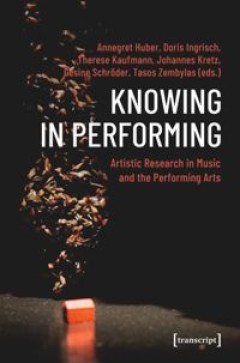
Knowing in performing: artistic research in music and the performing arts
How can performing be transformed into cognition? Knowing in Performing describes dynamic processes of artistic knowledge production in music and the performing arts. Knowing refers to how processual, embodied, and tacit knowledge can be developed from performative practices in music, dance, theatre, and film. By exploring the field of artistic research as a constantly transforming space for pa…
- Edition
- -
- ISBN/ISSN
- 9780429323058
- Collation
- 224 p.
- Series Title
- -
- Call Number
- 790.2 KNO K
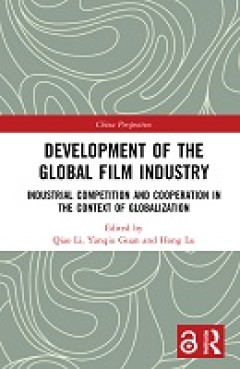
Development of the global film industry : industrial competition and cooperat…
The global film industry has witnessed significant transformation in the past few years. Regions outside the US have begun to prosper while non-traditional production companies, such as Netflix have assumed a larger market share, and online movies adapted from literature have continued to gain in popularity. How have these trends shaped the global film industry? This book answers this question …
- Edition
- -
- ISBN/ISSN
- 9781003051503
- Collation
- XXV, 243 p.
- Series Title
- China perspectives
- Call Number
- 384.8 DEV d
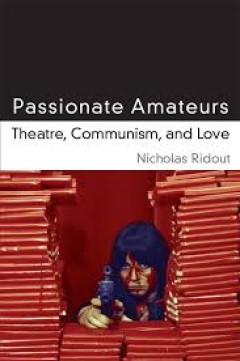
Passionate amateurs - theatre, communism and love
Beginning with Chekhov’s Uncle Vanya, Passionate Amateurs tells a new story about modern theater: the story of a romantic attachment to theater’s potential to produce surprising experiences of human community. Ridout argues that theater in modern capitalism can help us think afresh about notions of work, time, and freedom. Passionate Amateurs tells a new story about modern theater: the stor…
- Edition
- -
- ISBN/ISSN
- 9780472029594
- Collation
- 216 p.; 22 cm
- Series Title
- -
- Call Number
- 792 RID p
 Computer Science, Information & General Works
Computer Science, Information & General Works  Philosophy & Psychology
Philosophy & Psychology  Religion
Religion  Social Sciences
Social Sciences  Language
Language  Pure Science
Pure Science  Applied Sciences
Applied Sciences  Art & Recreation
Art & Recreation  Literature
Literature  History & Geography
History & Geography